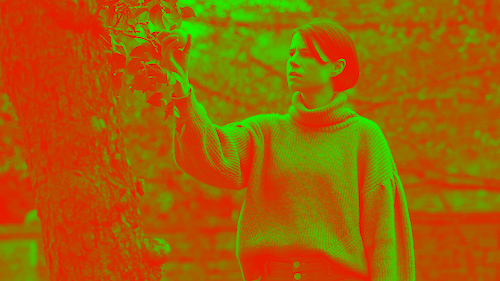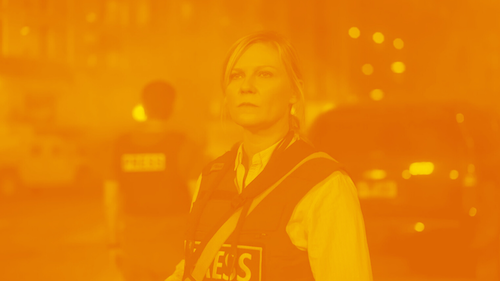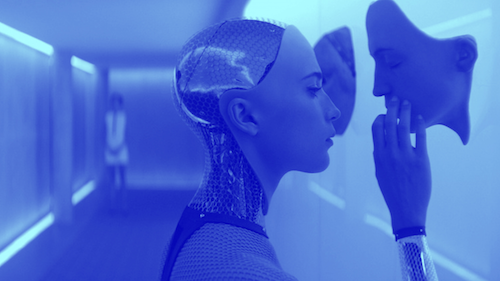Filmography Worship: Ranking Every Alex Garland Film
Written by Andreas Babiolakis
Filmography Worship is a series where we review every single feature of filmmakers that have made our Wall of Directors
Writer extraordinaire Alex Garland easily exemplifies what it means to be a director, and yet when you really consider his career, it’s almost as if being behind the camera is a secondary part of his life. Best known for his novels The Beach (which would be adapted by frequent collaborator Danny Boyle and screenwriter John Hodge), The Tesseract, and The Coma, as well as having written multiple times for the big screen, video games, and even creating the miniseries Devs, only four projects in Garland’s life are ones where he was a director (no surprise here, he also wrote all of the films he directed). Earlier this year, he announced that he was going to take an indefinite hiatus from directing so he could focus on writing again, so who knows when we will see another Alex Garland film (if ever). What I do know, however, is that his filmography is small but mighty: a mostly terrific slate of challenging, polarizing films that don’t buckle under the weight of societal and Hollywood expectations.
A terrific science fiction mind who has much to say about sociopolitical matters and abstract, philosophical concepts, Garland has always vowed to raise the bar and push himself as far as he can go; rarely does he get in over his head. I was considering placing the screenplays Garland wrote on this list as well, but I became afraid that this ranking would wind up looking more like a Danny Boyle-related one (whose career I will be covering in the near future). Instead, I’ll rank all of the films Garland directed and will toss in an anecdotal look at how I would rank Garland’s screenwriting for other directors, for those who are curious. I also won’t be including Devs here because of how different this miniseries is compared to the feature films I’ll be covering (it becomes a bit awkward to rank something from a different medium; if it felt like a long film, it would be easier, but it feels like a short television series which is its own beast). In the meantime, I want to celebrate one of the more exciting visionaries in contemporary film who never let studio meddling and the Hollywood game get in the way of what messages he wanted to tell. He has always championed women in strong protagonistic roles amidst landscapes of political horror and dread. He has succeeded with budgets big and small via his huge ideas and ambitions. Here are the feature films by Alex Garland ranked from worst to best.
5. Men
The only misfire in Garland’s career — even as a screenwriter — is Men: the well-intentioned horror film that becomes a bit of a narrative mess that gets in its own way. It tries so hard to explain the issues with misogynistic men in a problematic, skewed society, ideally through the female gaze (Jessie Buckley takes the lead here as the lone woman in a film full of piggish, toxic males). The issue is that there is much that Men is trying to say and yet it winds up telling us so little. I think most viewers get that men can be awful people, and those who disagree will likely never even watch a film like Men in the first place. We don’t get much more outside of this basic statement, so Men falls completely flat as a political comment. Where it does shine a little bit is with Garland’s vicious take on horror, which builds up to one hell of a climax that I still cannot shake off (keep in mind I’ve only ever seen Men once the weekend it opened). While the film acts nicely as a demo reel of what Garland can accomplish as a horror visionary, it is too weak to be considered a successful film, and this is the only time I’ve ever felt like Garland got ahead of himself.
4. Civil War
The most conventional Garland has ever felt as a director, Civil War still doesn’t hold any punches. A nice blend between blockbuster action and Garland’s typical relentless storytelling, Civil War feels like the desensitized sensation one experiences while doomscrolling on their smartphones: the acknowledgement and acceptance of brutality in the world because it won’t end and we feel helpless in the big picture. A film that progressively gets less and less hopeful, Civil War also pretends to hold our hand in the shallow end as we cross over into the deepest part of the pool and are forced to tread water ourselves (to be fair, we usually start in the deep end in Garland’s films). A necessary film released during a global crisis of divide and terror, Civil War projects itself as a future dystopian picture, yet it is secretly commenting on the state of things as they currently stand. If there was anyone that needed to take this project on and not sugar coat the severity of things, it’s Garland.
3. Warfare
Co-directed by Iraq war vet Ray Mendoza, Warfare is a real-time depiction of how quickly one’s passion to fight for their country can turn into a downward spiral of despair and a quest to remain alive. As we are pitted against the unknown (bullets and explosions happening from every direction) amidst Warfare’s slow and patient pacing, we understand what it feels like to be trapped with nowhere to go. As quickly as we send people to fight, they are abandoned during the worst nightmares of their life (should they even make it out in one piece). Warfare is as unflinching and bold as anti-war cinema gets with a refusal to sanitize any moment or grant us any reprieve (no flash-forwards, no music to coddle us, and no shying away from the atrocities of war). While still respecting those who wish to fight for their country, Warfare is a clear cautionary tale rooted in reality: this is what combat looks like as clear as day. What a nerve-wracking film, but one that boasts so much purpose, vulnerability, and honesty.
2. Ex Machina
Garland’s directorial debut, Ex Machina, was an overnight success and an instant science fiction masterwork. It accomplishes so much with its confinements. It displays a philosophical take on the Turing test (if a computer or artificial intelligence can trick a person into thinking it is also human) that transpires into a state of psychological delirium (we’re told right away that Ava is an android, and yet there are many moments in the film where the line between artificial and organic gets blurred). With a modest budget, we spend most of the film in one location (Garland turns a billionaire tech paradise into a jail we cannot escape). With so much focus on recruiting very few but important names of this generation of actors (Domhnall Gleeson and Oscar Isaac shine, and Garland mainstay Sonoya Mizuno is always great, but Alicia Vikander steals the show with one of the greatest android performances of all time), with the rest of the budget going towards the perfected CGI (which went on to win an Oscar over far larger Hollywood heavyweights). Ex Machina is a sensational debut made by an assured director, and it acts as a sign that this is a filmmaker who never wants to settle for simplicity; if this is where he started, who could tell where he’d go from here.
1. Annihilation
Netflix really dropped the ball on its Annihilation rollout, leaving the film to flounder its mere days in theatres before being banished to the streaming platform with little-to-no marketing for life. I’m happy that the film is getting its cult following because I’ll never forget leaving the theatre that opening weekend (I was fortunate that it was being shown in Toronto because it certainly wasn’t available just anywhere) and recognizing that I may have watched a new science fiction masterpiece. Years later, I still feel like what I saw was exemplary sci-fi from someone who already released a great modern take on the genre with Ex Machina. A breathtaking tribute to Andrei Tarkovsky’s Stalker and an exhilarating adaptation that improves on Jeff VanderMeer’s novel of the same name (it’s good but not this good), Garland takes the concept of mutation, biological deterioration, mental illness, pounding grief, and martyrdom, and creates a hallucinogenic, cryptic descent into madness. A bold take on psychological horror and sci-fi, Annihilation dared to go where so many other contemporary filmmakers would never attempt given the potential losses involved. It’s true. Annihilation took its box office bombing on the chin hard enough to lose teeth, but sometimes pure artistry can’t be restrained. I guarantee that the adoration for Annihilation will continue to grow as the years go by and people recognize the film for what it is: one of the great science fiction releases of the twenty-first century, and Alex Garland’s magnum opus.
Quick Recap On Alex Garland’s Screenplays
If I were to toss in Alex Garland’s screenplays in the ranking of his filmography (excluding The Beach, which is an adaptation of Garland’s book and not a screenplay he wrote), it would look a little more like this.
9. Men
• A strong sociopolitical idea surrounding the misogyny found in civilization that amounts to very little outside of artistic shock.
8. Dredd
• It’s questionable how much involvement Garland had with Dredd, to the point that his post-production efforts have some considering this film to be his actual directorial debut. Since this information is inconclusive, I’ll just be focusing on the screenwriting here, which is far more fun and camp (whilst never losing Garland’s sharpness) than you usually get from the British writer. An exciting take on an existing property, and a rare cinematic return to a franchise that’s better than the previous film (Danny Cannon’s Judge Dredd is so disastrous that it’s hilarious), Garland’s version is equal parts serious and playful. I won’t pretend it’s masterful, but it’s definitely worthwhile for action junkies.
8. 28 Years Later
• Garland’s return to the 28 Days Later universe with Danny Boyle is a fitting one that is more attached to the then-current sociopolitical turmoil of the United Kingdom (and, really, the world). Garland is able to match the emotional richness of the original property while also not offering quite enough to keep us feeling something new with this follow-up (we could get most of 28 Years Later’s messages through the first film). There’s some chilling warmth (a great paradox, I’m sure) in 28 Years Later that is a testament to Garland’s capabilities as a writer, and Boyle makes sure to extract every ounce of this tonal ambiguity and intentional uncertainty.
7. Sunshine
• While it starts off strong, the ending of Danny Boyle’s Sunshine may be a rare instance of weak writing by Garland. While the world-building in this science fiction film is extremely strong and the journey towards the end is an emotional, harrowing one, where Sunshine ultimately arrives is a dead end that somewhat squanders all that we’ve been through to get there. Still, it isn’t unlike Garland to take risks, and he usually does well with his decision-making. Not every gamble works, and the ending of Sunshine is such an example, unfortunately (the rest of the film is quite strong in comparison).
6. Never Let Me Go
• An underrated adaptation of Kazuo Ishiguro’s magnificent novel, Garland’s take on Never Let Me Go, directed by Mark Romanek, is an emotional take on individuality, friendships and love, and the youths of tomorrow growing up in a shocking future. Garland takes the poetic writing of the novel seriously and transfers it to this film, turning his propensity to shock audiences into a heartbreaking cautionary tale instead (the blows are softened a bit so we aren’t eviscerated; only saddened). Not enough people talk about the cinematic answer to Never Let Me Go, and it’s a shame.
5. Civil War
• A stronger blurring of mainstream action and political themes than Dredd. Civil War is a film that slowly reveals its true colours as it proceeds deeper and deeper into the fragmented heart of a divided nation.
4. Warfare
• A blatant look at what fighting in a war looks like and entails without, in typical Garland fashion, sugarcoating any of the particulates. A highly successful experiment with co-writer, war vet Ray Mendoza.
3. 28 Days Later
• I won’t include 28 Weeks Later because Garland’s involvement is unclear, but I must champion this poetic horror film collaboration between Garland and Danny Boyle. An unorthodox horror film that allows itself to bask in the optimistic times of hope and peace, 28 Days Later gets deeper and deeper into vulnerability before it tears our hearts out for good. It isn’t as scary as much as it is devastating, which is essentially an even more difficult sensation to grapple with. I was hoping that more horror films would feel like this one when it first dropped, but that isn’t the case; maybe the proposed sequels that Boyle and Garland are working on will help?
2. Ex Machina
• A terrific debut film that questions the human mind, artificial intelligence, and the blurred lines between who we are and what we create in the twenty-first century. It is a spellbinding look at how a science fiction opus can be effectively made with as little as possible.
1. Annihilation
• A masterwork of science fiction and psychological horror with the promise of becoming a cult classic whose reputation grows as the years come. Annihilation is an unfiltered, daring look at the ascent into madness via action, shocks, and abstract, otherworldly hysteria.
Andreas Babiolakis has a Masters degree in Film and Photography Preservation and Collections Management from Ryerson University, as well as a Bachelors degree in Cinema Studies from York University. His favourite times of year are the Criterion Collection flash sales and the annual Toronto International Film Festival.








